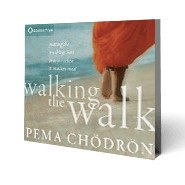Pema Chodron’s Living With Vulnerability is an online course that trains you in making friends with your mind. The mind is very wild and it often takes us on a crazy ride throughout the day – Isn’t it?
I am not sure if you have felt this before…but I sometimes feel that making friends with our own mind is often difficult than making friends with strangers. Do you agree?
Do you know what relationship you share with your mind? Is it kind, angry, upset, happy, or sad? Let me test your relationship with your mind. Answer these questions with Yes or No (Be Honest)
- Do you try to hide your authentic self i.e. your weakness or your imperfections?
- Have you decided to bury your negative feelings or Are you trying to ignore them?
- Do you often pretend that everything is fine, though deep inside you are sick of your life?
- Are you scared of those unpleasant thoughts or emotions which threaten to take you down?
What were your answers my friend – If you answered “Yes” then you just embraced your imperfections and insecurities. In other words, you choose to be “vulnerable”.
There is nothing wrong with being vulnerable, after all, we all by nature are vulnerable beings. However, for some reason most of us resist this vulnerability, we often consider vulnerability as our weakness, we put up barriers when we are faced with feelings of fear, self-criticism, or loss. The practical truth of life and living it is that we all vulnerable. Embracing your full self is as easy (or as difficult) as understanding and accepting yourself
This online course teaches you how to get comfortable with the feeling of uncomfortable and work towards taming the one thing that causes the most suffering – The Mind. You will learn how to embrace the full spectrum of your experience with unconditional warmth, openness, and kindness so that you live your best life.
Before I share the details of this course let me introduce you to the teachers of this online course.
Meet The Teachers

Ani Pema Chodron is an American Tibetan Buddhist. She currently teaches in the United States and Canada and plans for an increased amount of time in solitary retreat under the guidance of Venerable Dzigar Kongtrul Rinpoche.
She has written several books, including The Wisdom of No Escape, Start Where You Are, When Things Fall Apart, The Places That Scare You, No Time to Lose, Practicing Peace in Times of War, How to Meditate, and Living Beautifully. You can find the Pema Chodron Collections here.

Tim Olmsted has been a student of meditation for the past 40 years. He lived in Nepal for 12 of those years, working as a psychotherapist and studying with many of the greatest Buddhist teachers of our time. After returning to the United States, from 2000–2003 he served as director of Gampo Abbey, Pema’s home monastery.
He is currently the founder and president of the Pema Chodron Foundation and travels extensively, teaching meditation as a Senior Instructor for Tergar International, a worldwide meditation community under the guidance of Yongey Mingyur Rinpoche.
Session Highlights – What Will You Learn
Session 1 – Friendship With Oneself

In this session, Pema introduces us to the basic human quality of goodness, openheartedness, and love. She says it takes bravery staying with pain when it arises and not run or put barriers to avoid them.
She talks about cultivating a more empathetic relationship with ourselves. She draws parallels from Buddhist psychology where the emphasis is on the mental aspects of physical pain rather than the pain itself.
She infuses the practice of self-empathy i.e. treating ourselves with kindness. As many of us have conditioned ourselves to believe that being brutally self-critical is necessary to achieve the highest standards in life.
In this module, you will learn:
- How to get comfortable with unpleasant emotions so that you grow, learn and let go
- How to develop an unconditional friendship with yourself
- How to start to live a life of authenticity
Meditations
- Being Present
- Coming Back To Breath
Session 2 – The Art of Being Present

Tim Olmsted shows you how meditation practices help you to tap into your true self which is beneath all your thoughts and feelings.
He explains the art of being present is having my mind completely engaged and connected with wherever my body is at that point and not trying to be thinking about whatever I want to do next but instead be fully immersed in what’s going on in that moment.
He says happiness is found in the present moment that is why it is called “Present” (a gift) which can fully be experienced when your mind is connected with whatever your body is doing now.
In this module, you will learn:
- How to explore your natural self and open to present moment awareness
- How to release fixed ideas & why it is important for your growth
- Why everything you experience is a tool for awakening.
Meditations
- Faithful To Being Present
- Finding Balance
Session 3 – Embracing Difficult Emotions
In this session Tim shares meditation practices, techniques to face emotional challenges you are facing in your life. He explains how to “practice in the gaps” and take any moment life offers you and experience it to the fullest.
You are conditioned to avoid suffering however by learning to embrace dark emotions you gain access to your deepest source of strength. Tim shows you how to lean towards the uncomfortable emotions you are feeling without getting paralyzed by it.
In this module, you will learn:
- How to become less judgmental with ourselves and adopting a welcoming (gentle) approach towards pain.
- How to confront reality, retain hope, and honor the difficult path.
- How to feel your feelings all way through and uncovering warmth.
Meditations:
- Uncovering Your Buddha Nature
- Working With Your Thoughts
Session 4 – Developing “Discomfort Resilience”
In the final session, Tim explores the concept of “discomfort resistance” that shows the way to gradually learn to remain more open and accept unpleasant experiences.
He shows you a way to banish old formulas (mindsets) and make way for new patterns to nurture greater personal growth. The old formula: Pain x Resistance = Suffering. The new formula: Pain x Acceptance = Growth.
In this module, you will learn:
- How to develop the attitude of “Openness” & “Willingness” towards discomfort.
- How to use the “Gift” of compassion towards suffering and channelize it for your growth.
Meditations
- Undivided Awareness
- Working With Feeling
Two Bonus Programs
Bonus # 1

Pema Chodron’s audio program “Walking The Walk” – Pema offers four sessions of fundamental wisdom for living an authentic spiritual life. She shares a Fourfold Approach to Living with an Open Mind and Heart.
- Stabilizing the Mind – Awareness, presence, and the foundation of the spiritual path.
- Unconditional Friendship with Yourself – Getting unstuck from the patterns that create our own misery.
- Freedom from Fixed Mind – How to release biases and prejudices to revitalize your everyday experiences.
- Taking Care of One Another – Essential guidance in the ability to truly be there for others
No matter the situation you find yourself in, here is a program for remaining true to the values we seek to live by, and staying open to the kindness and love that is always available to support us.
Bonus # 2
With “How to Meditate”, the American-born Tibetan Buddhist nun presents her first book exploring in-depth what she considers the essentials for a lifelong practice.
This step-by-step guide shows you how to honestly meet and openly relate with the mind, embrace the fullness of our experience, and live in a wholehearted way. You will discover:
- The basics of meditation, from getting settled and the six points of posture to working with your breath and cultivating an attitude of unconditional friendliness.
- The Seven Delights – How moments of difficulty can become doorways to awakening and love.
- Shamatha (or calm abiding), the art of stabilizing the mind to remain present with whatever arises.
- Thoughts and emotions as “sheer delight”-instead of obstacles-in meditation
How Much Does This Course Cost
As I write this post, this course is available at a deep discounted one-time price of $197. The original price of this program is $397, so take advantage of this promotional offer till the time it is available.
They also have an installment option (for a limited time only), wherein you can access this program by paying 3 monthly installments of $77 only.
If you are not 100% satisfied for any reason, simply return it for a full refund for up to one year. With a 100% Money Back Guarantee there is nothing to lose.
Final Thoughts
Life can be a challenging road to walk – There are times when your thoughts will race with unpleasant emotions that tend to threaten us and break us down. In such times when the feelings of vulnerability surface, you need training to stay present and confront reality instead of resisting the pain.
What you learn in this course is to make peace with life’s challenges and the wildness of your mind, using meditation practices and techniques staying present, and exploring the new depth of self-acceptance in all areas of your life. I hope these teachings help you learn how to treat your own life experiences and live a life with limitless potential.
Please note I receive compensation if you click on any links mentioned in this post to purchase a product or service from the third party website. Also, purchasing a product or service from the above links does not increase your purchase price, however, it is a great way to thank me if you enjoy my content and find my suggestions useful. I only recommend products and services that I have personally used or thoroughly researched.


Hi Satish,
Being friends with your own mind is a very interesting concept and one I never really thought of it. The old cliché “We are our own worst critics” comes to mind when I think about this course. I think that we are hardest on ourselves and that may well be because we are not friends with our minds! This has given me something to think about! Thank you for your informative post and thorough breakdown of the course!
Hi Tom,
You are correct when our own self-imposed high expectations cause us to turn on ourselves with nasty, self-deprecating words, it is then that we become our very own worst critics. Be gentle on yourself and treat yourself with the kindness that you would extend to your best friend. Send healing love to yourself, stay calm and give yourself grace for the moment ~ Stay Blessed 🙂
Hi Satish,
As I read this post, it is clear that self-acceptance, honesty with oneself and acknowledgement of ones own vulnerabilities is a good starting point to allow for positive change.
Hi Schalk,
Absolutely! When we’re self-accepting, we’re able to embrace all facets of ourselves. Being honest with oneself helps you detect self-deception that we use as a smokescreen to mask our problems. Acknowledging our weakness is not being vulnerable; it’s having the courage to show up and be seen when we have no control over the outcome ~ Stay Blessed
Hi Satish,
Thank you for such inspiring and useful information. I think that this kind of learning about oneself and one’s emotions is extremely important for every person, especially in times of crisis when it is necessary to stay mentally healthy.
Regarding vulnerability, I don’t think it’s a weakness, because every man is wounded in some way, everybody has a weak point. The problem arises when a person does not know how to use his vulnerability and his negative emotions and experiences in the right way.
I think that even those negative things that happen in life teaches us and help us in personal development. This topic is extensive and complex and could be written about indefinitely. Keep helping people this way! Regards, Danijela
Hi Danijela,
Well said my friend, you are allowed to make mistakes just like every other person. It does not make you less worthy, not dumb, nor less smart. Become more objective about your abilities and actions through the practice of self-compassion. Be deliberate in nursing positive emotions and approve of yourself more and more ~ Stay Blessed 🙂
Hi Satish,
This sounds like a very comprehensive course. The teachers have a lot of experience in the subject. I definitely struggle with my relationship with my mind and vulnerability. I also have a hard time being present and enjoying the moment. I think at the moment everyone could benefit from a course like this. Thanks for sharing this information.
Hi Justin,
Indeed…I am happy you found this information useful. I am sure this course will help you strengthen your relation with your mind and provide you the tools to live a more authentic life that comes from a real place within. It is when our actions and words are congruent with our beliefs and values. It is being ourselves, not an imitation of what we think we should be or have been told we should be ~ Stay Blessed 🙂
Hi Satish,
Thanks for sharing this. The course sounds very thorough and delves into many of our more obscure, uncomfortable, and therefore vulnerable parts of our minds and emotional frameworks. I can think of a few key times in my life when I was forced to confront such delicate areas just to be able to carry on.
Sometimes emotional disfunction can be so extensive and intense that it will manifest as physical injury. I think this points to the value and necessity of dealing with these issues through programs like this one. Thanks again and best regards, Andy
Hi Andy,
Self-punishment is so persistent because it is an all-purpose defense against the pain of life. Moving beyond self-punishment becomes possible when we get the help that we need to navigate in a new way when we feel pain. When we develop compassion within us we find that we have resilience to manage the pain of real life and the skill to identify and pursue what we want and need ~ Stay Blessed 🙂
Hi Satish,
I recently got into meditation every morning and I can honestly say it has improved my focus levels a lot. I actually got the headspace app on my phone but that’s a yearly renewal. I like the one-off payment for this course. Maybe in the future, I’ll have to look into it.
Hi Shaun,
Sure…good to know that meditation is helping you focus. Wishing you all the best with this course ~ Stay Blessed 🙂
Hi Satish,
I try meditation quite often. It does help me to relax my mind and body before going to sleep at night. It always helps me to focus better.
I certainly like the idea behind Session #3 Embracing Difficult Emotions. This would certainly be the area that I have a problem with in my own life. If I could conquer this particular factor, I would be a much happier individual.
Hi Barbara,
As humans, we do everything we can do to reduce our suffering and to avoid pain — emotional or physical. So it is difficult to accept the pain [of our emotions] and not try to do anything to fight it. When we fight the pain: judge it, try to push it away, avoid it, ignore it, it actually triggers other painful emotions, resulting in more emotional pain. Session 3 of this course explains how to confront reality without judging the negative emotions and honor the difficult path with a gentle approach of warmth ~ Stay Blessed 🙂